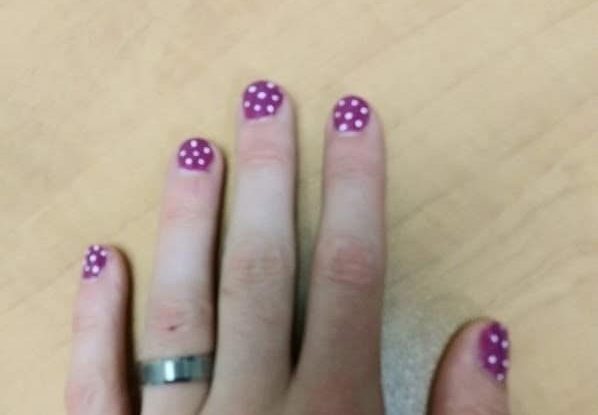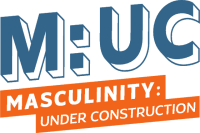
I am a cis, white, heterosexual man, and asked my supervisor whether she wanted to polish my nails. She has great nail polish skills, during xmas she paints small penguins and during autumn plaid patterns, true pieces of art on two square centimeters of nail. I always thought that nail polish is an obligation for many women, but the process of painting my nails felt unexpectedly caring and intimate. Intimate like, connecting in a new manner with people, with my body and myself, possibly similar to a massage.
To provide some context, I work with perpetrators of domestic violence, mostly men. They have to participate in groups for twelve weeks, 2.5 hours per week. During these groups we discuss why they used violence and how they can avoid using violence in the future. Many of these men have sexist ideas, for example about the division of tasks in the household. They also have unhealthy ideas about what it means to be a man, that men have to act masculine. That men have to be strong in mind and body, and therefore cannot ask for help and support. That men have to bring home the bacon, that we have to wear the pants and make the decisions. A tad of paint at the end of my fingers threatened my masculinity, and for some reason or another also the masculinity of my clients. I thought that was strange and I wanted to experiment with that.
When I wore my nail polish to these groups, I received the reactions I expected, but somewhat less intense. In such groups, the most important tool is the therapeutic relationship between client and counselor, because clients only listen when there is trust. Painting my nails damaged that trust, as some clients thought I tried to make fun of them. When I entered the groups a few clients yelled: “Wtf Jan! What is that!” It was impossible to start the group conversations without first explaining why I had polished my nails, as the clients refused to listen if I did not explain why I broke our common masculinity protocol. I provided my clients with two reasons:
Men commit most of the violence in our society, and mostly towards non-masculine folks. It was an important goal of mine to normalize non-gender-conforming behaviors. As a white man and professional counselor, I am not at risk of being victimized by violence, especially not by my own clients. Violence is almost exclusively aimed at certain groups, to which I do not belong. The groups are often women and racialized folks, but even more folks who transgress the gender binary (transgender, intersex, non-binary) and those who are at intersections (black and transgender). By wearing nail polish myself, I signaled that gender non-conforming behavior is normal, which might make folks who transgress those norms a bit safer.
Secondly, or so I told my clients, I thought it was interesting to see how folks reacted to a man with nail polish. My closest male colleague was unable to stop laughing, the first two days that I wore nail polish. He was unable to handle my choice, and it made him intensely uncomfortable. A few of my progressive male friends saw the nail polish immediately, but they decided not to ask and pretend it was normal. It was also my goal to pretend this was normal, so I found myself in the weird situation that all of us really wanted to talk about it but we all kept silent.
While I was having a beer with some friends, I started chatting with a friend of theirs who I had never met before. He told me that he recognized me from the Kitchener market, a somewhat large event with a few hundred folks visiting. Apparently an unknown man with painted nails is uncommon and memorable enough, to notice between hundreds of people. I think all men directly noticed that I was fooling around with my masculinity, and that almost everyone felt uncomfortable. Some men had experienced such uncomfortable feelings before, and tried to normalize the situation without requiring me to support them. Other men, especially my clients, required my help to understand and process their emotions.
After I explained my reasons for the nail polish to my clients, I explicitly challenged them. I asked them whether they felt uncomfortable, and how they handled those emotions. That way, I forced them to take their own emotions seriously, to understand their emotions and reflect on them. Then I asked them how they acted on their emotions. I asked them whether they would treat me differently now that they felt uncomfortable with my nail polish. These conversations were a bit tense. At the end of the conversations, my clients understood that it was their responsibility to process their own emotions, and that they should not change their behaviors towards me because of their uncomfortableness.
All men supported my choice to wear nail polish, including my clients. I am convinced that my privilege played a role. I do not have to be strong to count as a man, because I am highly educated and white, and because I wear buttoned shirts. MY male credentials are not based on muscles or toughness. I am an academic expert on masculinity, and trained to have uncomfortable conversations about emotions and leftist stuff like that. During especially challenging conversations with my clients, I was the boss in the space, and I was able to ask clients to leave the space. Having such conversations was my job, I got paid for it, and since I had power in the groups my clients listened to me. But having such conversations constantly with family members, colleagues or friends of friends, without getting paid or without having the power, seems very tiring and scary to me.
I felt at ease in high-end coffee shops, where I collected stamps and drank my daily flat whites. Baristas there did not react to my nail polish, or gave compliments. Especially women in these spaces that I experienced as safe, took explicitly the time to give me compliments and support me. Often they sought physical contact, such as a hand on my back or shoulder. This was a gesture of solidarity and trust, a moment where they told me that they loved my nails. During nail polish week, this happened regularly every day. Before and after nail polish week, I have never been approached through physical contact by a woman who I did not know. It was funny that many women were confused about the adjectives to describe my nail polish. Cute or beautiful seemed to feminine for my otherwise masculine appearance. I also felt a bit like a thief or deceiver, as these women put energy in supporting my feelings and confidence, while this was only an experiment to me.
In spite of all this support, I would not wear nail polish to a job interview or when reporting a crime at the police. When I ordered a Beyond Meat burger at the A&W, I felt all eyes on me, and the cashier started stuttering when she saw my polished nails. I did not feel safe everywhere, not because I felt physically unsafe, but because I felt like I did not belong, because everyone turned around, watched me and because everyone was hyper aware of my presence in those spaces. The only time I had experienced something similar was on holiday in South Africa or while working in India, but that was different because as a white male I was more. With my nail polish I was suddenly less, at least, that was how it felt to me. And I was struggling with those feelings myself as well. Especially the first few days with nail polish, my hands did not feel like my own. My self-image as man was changed, and I felt a light form of anxiety. I constantly had to remind myself that my value as man did not depend on my nails, and also that it was ok to feel uncomfortable at times. Processing and managing these emotions required constant attention and energy. I was happy that after a week, I could dive back into my man box, with clean nails and white buttoned shirts.
I chose for a week of slight discomfort, this does not make me an expert on marginalization, micro-aggression, safe spaces, and such. I do hope that it contributes to increasing my own understanding, and that it taught me to better process my own emotions. I also hope that it helped other men to do those things, and above all that it increased safety for those who transcend or transgress the gender binary, if even just a bit.
